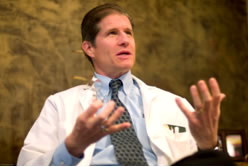For the past several months, I have been searching for a new blog title. Nick’s Blog, NickJacobs.org, Ask a Hospital President, Taking the Hell out of Healthcare… none of them really told the story of my passion, my drive, my desire to change healthcare in a way that would be meaningful for every patient, every employee, and every physician. Finally, the idea of what exactly I believe in, try to strive for, and teach hit me: “Healing Hospitals.” Not only do I believe that we can make our hospitals healing places, I also believe that we can heal the hospitals themselves.
For too many years, the Socratic style of teaching our docs has basically made many of them as tough as professional football players. We have experienced “The Old Guard” in nursing, where, when new nurses come on board the older nurses are encouraged to “eat their young.” We also know that the over-utilization of overhead paging, blood tests in the middle of the night, loud staff members, et al lead to what can only be described as a tense environment.
For the past 20 plus years, we have advocated a kinder, gentler hospital environment. During that time we have introduced all types of non-traditional healing environments, integrative medicine, roving psychologists, drum circles, aroma, music, pet, and humor therapy as well as the elimination of bullies from the medical staff.
 These are just a few of the very effective mechanism that can be introduced to create healing environments in hospitals. Healing gardens, labyrinyths, 24 hour visiting, double beds in the OB suites, and the beat goes on and on with decorative fountains, fireplaces, skylights, balconies, but most importantly dignity and respect amongst all staff and visitors toward patients. So, “Healing Hospital” has multiple meanings. Healing will take place more quickly, thoroughly, and meaningfully in these facilities, and the entire staff will be charged with the promotion of healing by creating an overall healing environment.
These are just a few of the very effective mechanism that can be introduced to create healing environments in hospitals. Healing gardens, labyrinyths, 24 hour visiting, double beds in the OB suites, and the beat goes on and on with decorative fountains, fireplaces, skylights, balconies, but most importantly dignity and respect amongst all staff and visitors toward patients. So, “Healing Hospital” has multiple meanings. Healing will take place more quickly, thoroughly, and meaningfully in these facilities, and the entire staff will be charged with the promotion of healing by creating an overall healing environment.
Well, I’m sure if you type in nickjacobs.org or even Ask a Hospital President.com you’ll still get to us, but remember that our overall goal, our direction, our mission, our passion, and our job is to help you to create healing environments where infection rates drop, as will lengths of stay, readmision, restraint and mortality rates. Call us at SunStone Consulting, LLC. 412-992-6197.






